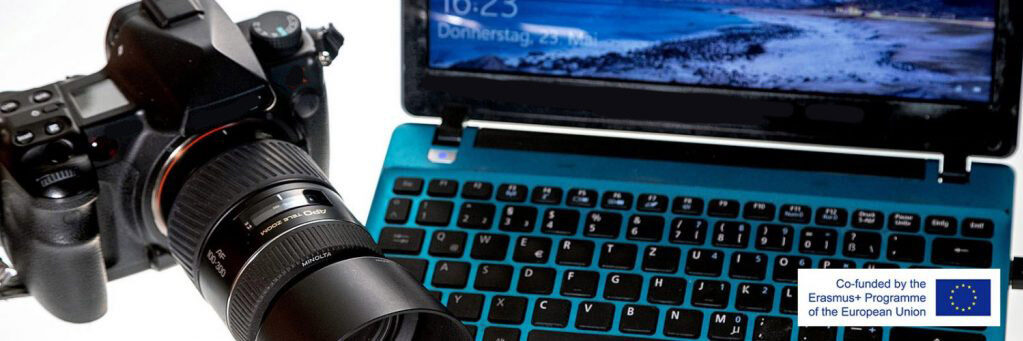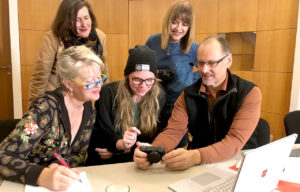The developed course uses Moodle as a learning platform and is structured as a Blended Learning Course. The content has been created in English (the so-called master course) and has been translated into Spanish, Portuguese, Greek, and German language.
Austria
The Austrian course started in March and – due to the COVID-19 pandemic – switched to a distance learning course only. 12 people participated in the course. To replace the on-site training virtual meetings, based on ZOOM as the communication platform, have been implemented. The course ended on May 29th.
The feedback given by the participants during the last virtual meeting will be used for amendments of the course and implemented into the second run.
Further details: Summary Pilot Course Austria
Greece
General organizational issues
The 1st course on “Development of Digital Skills through Photography” started on March 20, 2020 and ended on June 30, 2020. EDRASE announced the course on social media and the e-mail contact list. Participants were selected from individuals who completed a digital application. A total of 28 people registered and 14 were certified. The course was conducted entirely from a distance, through the Moodle educational platform, in which the courses were uploaded. The trainees had access to the course material through the e-learning platform Moodle and the participants were supported by the trainers, using tools such as forum, chat, email and video conferencing. The material for a new lesson was posted each week and participants were invited to submit assignments related to the respective unit. The content of the online courses was translated and adapted from the original course material produced during the project.
Grading
The trainees, after completing their work, were asked to send it either to their trainers through the platform, or to present it to their peers in the chat. Each trainee must provide an answer within two weeks of uploading the work to the Moodle platform. After that, the rating is locked and no other tasks can be submitted. The instructor checked the correctness of each task and gave a grade of – 1 (completed successfully) or 0 (not completed successfully). Along with the grade, feedback is provided to the learner on the quality of the response. Another tool offered to the trainees to upload the results of their work was the Facebook teams. A closed group was created only for trainees and trainers. Each trainee had to present their own work to others. Interaction between peers is greatly facilitated in this way. Each trainee, having completed 75% of the assignments, is considered to have successfully completed the course.
Course evaluation
Before the lesson, the trainees fill in a questionnaire, which is related to their degree of competence in digital skills and also their expectations from the lesson. At the end of the lesson, the trainees filled in another questionnaire where they were asked about the general and specific impression of the lesson, their best and worst moments, their suggestions and the degree of fulfillment of their expectations.
Spain
Portugal
The 1st course was held under exceptional circumstances, in the midst of the 1st general lockdown that was felt throughout Europe and the world due to the COVID-19 pandemic.
Initially, Proandi’s idea was to carry out as b-learning course, however, on March 13 2020, it was decreed that all schools, universities and VET institutions would be closed, having been forced to adopt a distance learning regime. In this sense, the process of selecting trainees was more difficult, as well as the entire organization of the course’s logistics.
- START AND END OF COURSE
The course was scheduled to start on March 16 but due to the quarantine of COVID-19 and with Proandi’s closure from March 13, the period of the course was from 6 April 2020 to 21 May 2020.
- LAY-OUT OF THE COURSE
The initial idea was to develop a b-learning regime, because, since it is an initial course and the trainees do not have much experience, it would be better to carry out distance and face-to-face sessions at Proandi to verify the work done. Due to the obligation to stay at home because COVID-19, the course was developed entirely at a distance basis. The course was taught by a Multimedia professional, Hélder Campos.
- TARGET GROUP AND BACKGROUD
All the participants were Proandi trainees from the Courses Pastry and Cooking Technician and Restaurant and Bar, level 4 EQF. 15 participants signed up for the course and started it, but only 5 (1 girl and 4 boys) completed the course. They were from 16 to 20 years old and most of them were beginners, did not have many digital skills, and the fact is that they are only used to taking pictures with their mobile phones, and many of them have never used a professional camera.
- METHODOLOGY OF SESSIONS
The course was carried out in:
– 8 synchronous sessions using video conferencing on Jitsi meet, three days a week, each lasting 1:30h;
– Asynchronous sessions through Moodle platform https://moodle.project-cicero.eu/login/index.php, where trainees submitted their assignments by each module;
– 3 hours of tutoring through answered questions, coments on Facebook posts, verification of assignments and correction of some content for the theoretical modules private course group on Facebook and group on Messenger;
– Moodle was organized with the previous modules created but then translated into Portuguese. (these material can be found on google drive).
- TECHNOLOGICAL RESOURCES USED
The initial idea was to develop a b-learning regime, because, since it is an initial course and the trainees do not have much experience, it would be better to carry out distance and face-to-face sessions at Proandi to verify the work done. Due to the obligation to stay at home because COVID-19, the course was developed entirely at a distance basis.

